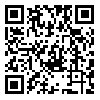BibTeX | RIS | EndNote | Medlars | ProCite | Reference Manager | RefWorks
Send citation to:
URL: http://sjsph.tums.ac.ir/article-1-163-en.html
Background and Aim: Type 2 diabetes mellitus is a heterogeneous disorder resulting from a combination of genetic and environmental factors which contribute to pathogenesis by influencing beta cell function and tissue insulin sensitivity. Protein tyrosine phosphatase 1B (PTP1B)" efficiently dephosphorylates the insulin receptor and attenuates insulin signaling. Recently, a 1484insG variant of the PTP1B gene was linked to increased risk of the metabolic syndrome in an Italian population, but this was not confirmed in subsequent studies. The purpose of this research was to investigate the association of 1484insG polymorphism of the PTP1B with obesity, insulin resistance, type 2 diabetes and other cardiovascular-related traits in an Iranian population.
Materials and Methods: The genotypes of 1484insG variant were determined by the PCR-RFLP method in 242 unrelated subjects, including 171 individuals with normal glucose tolerance and normal fasting glucose levels, and 71 type 2 diabetics. Insulin resistance was assessed using the homeostasis assessment model.
Results: The allelic frequency of the 1484insG polymorphism among type 2 diabetic patients and non-diabetic individuals was 6.3% and 3.8%, respectively (p=0.205). None of the subjects were homozygous for the 1484insG allele. Concerning quantitative traits in non-diabetic subjects, carriers of 1484insG allele had significantly higher body mass index (p=0.01), diastolic blood pressure (p=0.012), and HOMA-IR (p= 0.041) levels compared to those carrying the wild-type genotype. In type 2 diabetics, carriers of 1484insG allele had only significantly higher HOMA-B (P= 0/04) level compared to the individuals with the wild-type genotype.
Conclusion: Our results from a sample of Iranian type 2 diabetes cases and controls provide evidence that the 1484insG genotype of the PTP1B gene may be associated with obesity and insulin resistance.
Received: 2006/04/25 | Accepted: 2007/06/26 | Published: 2013/08/11
| Rights and permissions | |
 |
This work is licensed under a Creative Commons Attribution-NonCommercial 4.0 International License. |





